 Petzlover
Petzlover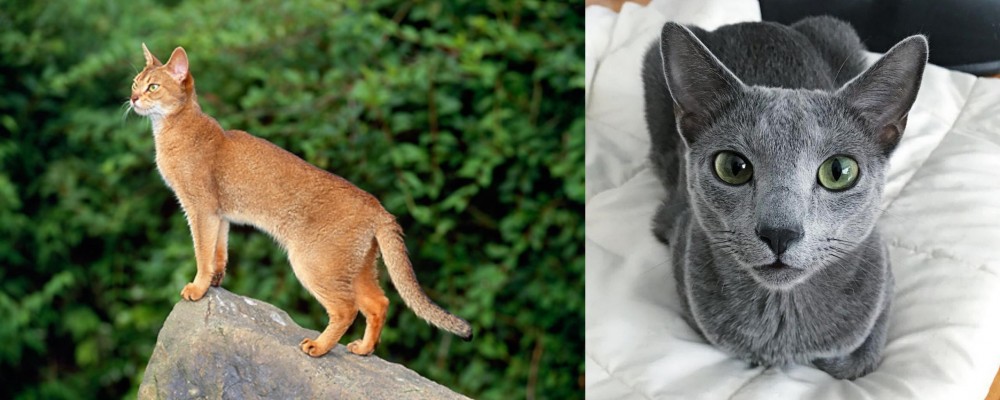 Abyssinian is originated from Ethiopia but Blue Russian is originated from Russia. Both Abyssinian and Blue Russian are having almost same weight. Abyssinian may live 7 years less than Blue Russian. Both Abyssinian and Blue Russian has same litter size. Both Abyssinian and Blue Russian requires Low Maintenance.
Abyssinian is originated from Ethiopia but Blue Russian is originated from Russia. Both Abyssinian and Blue Russian are having almost same weight. Abyssinian may live 7 years less than Blue Russian. Both Abyssinian and Blue Russian has same litter size. Both Abyssinian and Blue Russian requires Low Maintenance.
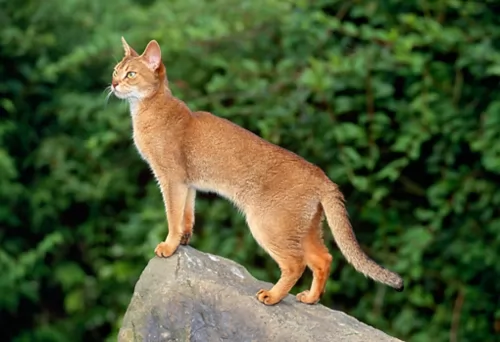 Known also as the Bunny Cat or the Abys, the Abyssinian cat hails from Abyssinia which is today known as Ethiopia.
Known also as the Bunny Cat or the Abys, the Abyssinian cat hails from Abyssinia which is today known as Ethiopia.
It is believed that the cat was brought to the UK in the 1860s. At first the cat was crossed with British Shorthairs, and later with oriental breeds.
The cat was imported in 1900 to America with some breeding programs starting in the United States in the 1930s. It is thought that it was a good thing that cats were exported to the U.S. because World War II took a toll on breed numbers but the breed was built up again in the USA.
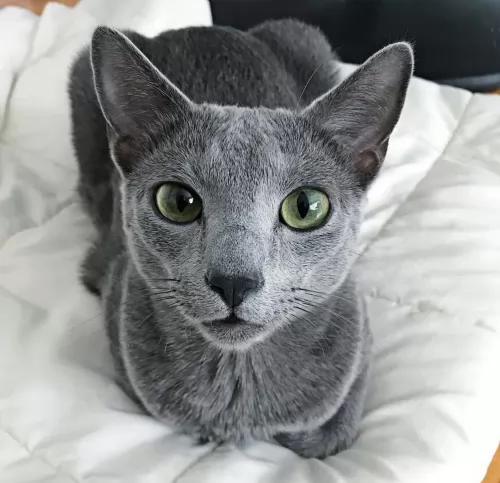 The Blue Russian is a rare cat and not much is known about its origins, but it is believed that the cat comes from northern Russia.
The Blue Russian is a rare cat and not much is known about its origins, but it is believed that the cat comes from northern Russia.
The Cat Fanciers Association believes that the cat descended from cats kept by Russian Czars. Research tells us that there is no mention of the Blue Russian until the 19th century. The Russia Blue made its first public appearance in 1875, being exhibited at London’s Crystal Palace as the ‘Archangel Cat’.
By 1912, the Russia Bue was given its own classification after its introduction to the USA in the early 1900s.
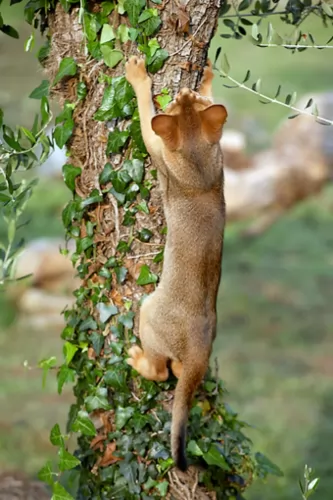 The Abyssinian is a slender, lithe, fine-boned, medium sized cat with shortish to medium length silky hair and long, slender legs.
The Abyssinian is a slender, lithe, fine-boned, medium sized cat with shortish to medium length silky hair and long, slender legs.
The fur has a distinctive ticked look. The coat comes in several colors – but its base color is a glossy reddish-brown base with black ticking.
You’ll find that the feline reaches a height of 20-25 cm and that its length is roughly 30-41 cm. When your Abyssinian is an adult it will weigh about 4-5 kg. With good care, your feline pet can reach up to 13 years of age.
The kittens are born with dark coats, but as they mature, the coat lightens. The head of the cat is somewhat wedge-shaped and it has fairly large ears with big almond-shaped eyes. The eyes can be green or hazel, depending on the coat shade. The tail is long and tapering.
The Abyssinian loves leaping onto cupboard tops or anything that has some height. It's an intelligent cat this Aby and always on the go. He is a playful cat and just loves being the center of attention, and when he has lots of toys he is always occupied, entertaining you with his antics.
If you were to be away at work every day, it would be a good idea to have a friend for him because he’s the kind of cat that becomes bored and lonely and then he becomes naughty. This cat is known as a clown with its outgoing, mischievous nature.
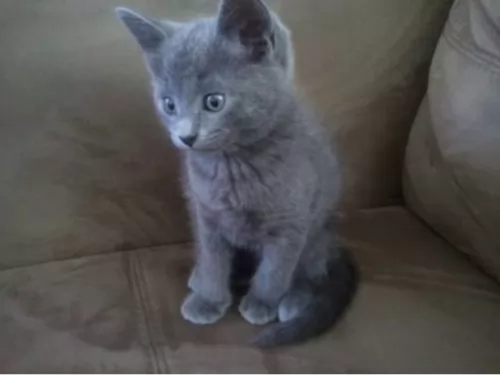 The Russian Blue is a medium-sized cat with a long, finely-boned boy. It is a slender cat, but he appears larger because of his dense double coat.
The Russian Blue is a medium-sized cat with a long, finely-boned boy. It is a slender cat, but he appears larger because of his dense double coat.
He weighs in the region of 3 – 6kg. In spite of the dense and luxurious short silvery coat, the cat doesn’t shed much. The coat can in fact be a silvery shade to a dark slate grey. The eyes are a beautiful green, the ears widely spaced and slightly rounded at the top.
The Russian Blue is a sweet-tempered cat who becomes attached to his human owner and who will even follow his owner much like a dog.
This particular cat breed may be quite shy, but he becomes social around his family members and may even be reluctant to share time with strangers.
He also doesn’t mind spending some time alone if you have to work. Curious and intelligent the Russian Blue is somewhat reserved but he makes a great companion as he is sensitive to his owner's moods.
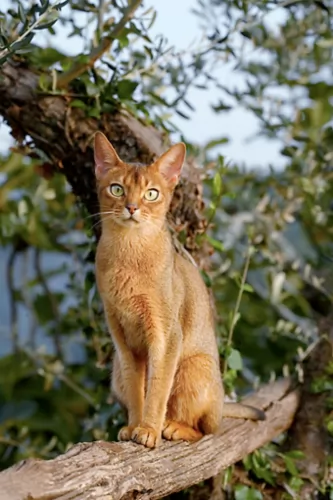 Your active Abyssinian cat is such a pleasure to have in the home as these cats love their human family as well as other pets in the home.
Your active Abyssinian cat is such a pleasure to have in the home as these cats love their human family as well as other pets in the home.
He’ll talk to you in a quiet way. They’re playful cats and you want to make sure you supply him with some stimulating toys.
Remember to brush his coat gently and make it a special therapeutic, bonding time. Make sure your active cat has exercise and provide some climbing equipment for him. Most of all he just wants to be around you and to get your loving attention.
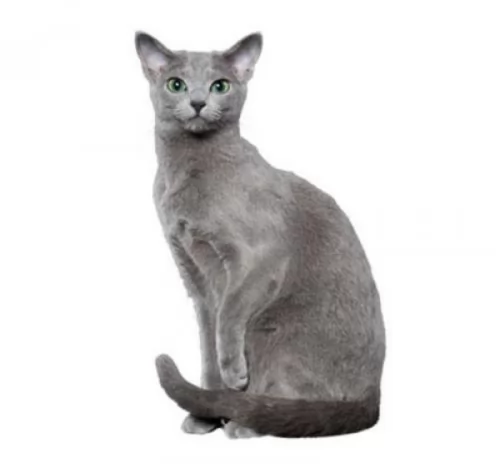 Russian blue cats are such intelligent creatures and he will require some mental stimulation because of it.
Russian blue cats are such intelligent creatures and he will require some mental stimulation because of it.
He loves mealtimes, but remember to not overfeed him as this shortens his lifespan.
He is a vocal cat and will tell you when he is hungry or he wants to play.
These cats don’t like too many changes so keep things the same for him.
When you try to keep your lovely Blue Russian happy, you’ll be rewarded by having a fantastic feline companion.
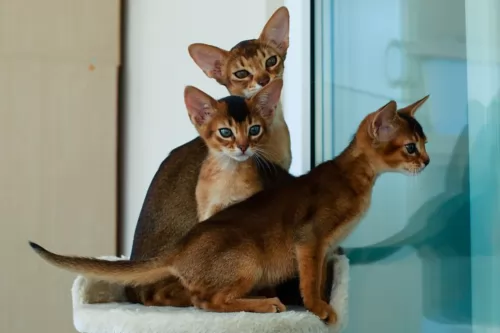 The Abyssinian has been known to be prone to kidney disorders. It can also be prone to gingivitis which can lead to periodontal disease.
The Abyssinian has been known to be prone to kidney disorders. It can also be prone to gingivitis which can lead to periodontal disease.
Also, the Abyssinian has been known to have problems with blindness. An eye problem, called progressive retinal atrophy is where the cells deteriorate over time and this is what causes the blindness.
The Abyssinian can also be prone to patellar luxation where the kneecap can become dislocated.
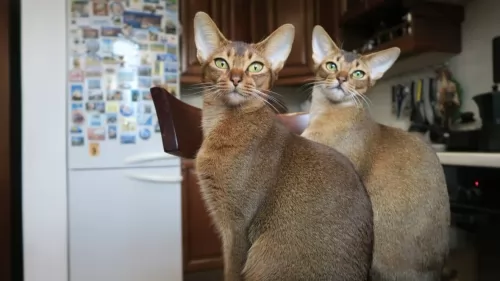 The Abyssinian cat’s short, fine coat is easy to care for. Brush and comb it timeously to remove loose hairs.
The Abyssinian cat’s short, fine coat is easy to care for. Brush and comb it timeously to remove loose hairs.
Because of periodontal disease, brush your cat's teeth. If you feel you don’t know how to perform any of these ‘caring’ routines for your kitty kat, don’t despair as your vet can do a dental cleaning procedure as well as your pet groomers.
Your Abyssinian cat is carnivorous and will need food similar to that which they would prey on in the wild. Your cat will require foods high in protein and with added vitamins and minerals.
Avoid cat foods that add in useless fillers such as wheat and soy. It is important that you buy the right cat food for your Abyssinian, and if you’re in any doubt, speak to your vet. Make sure your cat always has access to a bowl of fresh, cool water.
Always keep your Abyssinian’s litter box spotlessly clean. You can keep a special little plastic rake to rake up the sand and rid the box of cat droppings immediately.
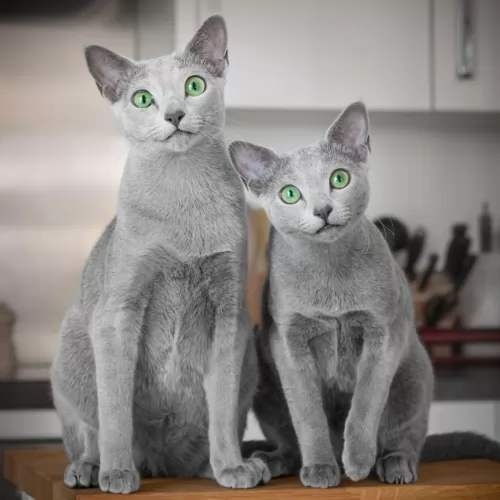 Part of caring for a cat as a responsible pet owner comes from feeding your pet. The Russian Blue is a cat that enjoys his food so you will have to look out for overfeeding.
Part of caring for a cat as a responsible pet owner comes from feeding your pet. The Russian Blue is a cat that enjoys his food so you will have to look out for overfeeding.
A cat that is overweight can start developing joint problems and diabetes. Rather stick to scheduled meals so that you can know exactly what your feline pet is getting. Such a beautiful cat needs the best food there is to keep the coat shiny and healthy and to prevent illness.
Always read the food labels to ensure the best ingredients and the right portion sizes. Make sure your cat gets food that is meat protein-rich as a cat is a carnivore.
Water is another important part of your Blue Russian’s diet. Fresh cool water should be available for your cat night and day. Water bowls are good but a water fountain is a tantalizingly attractive way for your pet to be attracted to drinking more water.
Make sure that you rake up all your cat’s droppings from the litter box every day as the Russian Blue is a hygienic cat and wants a clean litter box. Make sure the litter box is in a nice quiet spot for your cat.
The cat has a dense coat but isn’t a heavy shedder and requires very little grooming.
Ensure a decent bed for your Bombay cat. Any soft cat bedding will do, and while some cats like a simple flat mattress-type bedding arrangement, other cats like the idea of getting into a bed that provides some privacy.
You just have to find yourself a decent pet shop because when you do, you’ll find a host of soft, warm, fully washable blankets and pillows for your pet. Once you’ve decided on the right bed and a nice quiet spot, your cat will have a complex issue sorted out as some cats can be fussy with their sleeping arrangments.
Make sure your cat is neutered or spayed to avoid unwanted kittens. Neutering offers health benefits, reducing the risk of different cancers. Your cat also no longer has the desire to fight over mates and territory.